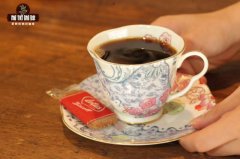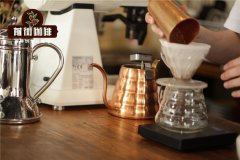Guide for beginners on how to make coffee at home
When you think about your favorite coffee, or coffee from your favorite coffee shop, do you want to recreate the same good coffee quality at home? Many beginners find this daunting, but Qianjie Coffee has a good piece of advice: although making professional espresso at home is an expensive investment, it is more economical to brew it manually.
Then take a look at how to make your own coffee brewing bar. From filtering coffee to brewing, here is everything you need to get started. More importantly, to be honest, doesn't it feel better to brew the first cup of coffee of the day by yourself?
Coffee beans
First of all, of course beginners need coffee beans! The front street recommends whole beans instead of ground coffee. But, other than that, it all depends on your personal taste.
Maybe you like the floral and fruity smell of your coffee. Or maybe prefer chocolate-flavored nuts? No problem: just ask the barista in the coffee shop for advice.
However, if you want to know more about the coffee beans you buy, consider where your favorite coffee comes from and how well they are roasted. Knowing this will point you in the right direction in the future.
Of course, the configuration of coffee is not just about coffee beans. And the brewing method will affect it, and the water temperature and grinding size will also affect it.

Coffee storage skills, good coffee storage can bring good coffee quality
one. Baking date is very important! Coffee is a natural product, so it has an expiration date. This will be different, but a good rule of thumb is to buy only the coffee you want to drink that week.
two。 Store coffee in an airtight container at room temperature to avoid direct sunlight. Oh, never put it in the fridge. It will absorb the aroma of all the other food there.
Cooking equipment and filter
There are a variety of devices for beginners to choose from. The two main things to consider are the flavor features you want and ease of use.
For filter / pouring equipment, the most famous are Chemex, Hario V60 and Kalita Wave. Pouring coffee is cleaner than soaking coffee.
On the other hand, the main immersion brewing equipment is AeroPress, French press and Clever. It's all about a bigger body. Of course, there are siphons and ibrik-complex traditional brewing methods that are not recommended for beginners.
Don't ignore the importance of filters.
1. Keep the equipment clean. Be sure to wash off all the coffee oil after brewing, otherwise you may taste them in the next cup of coffee.
two。 Rinse filter paper before use. Use hot water to remove the paper flavor so that you can drink a cleaner cup of coffee.
3. Preheat your device and your cup for a consistent extraction effect. If the hot water encounters a cold brewing device, it cools immediately. Then, as the equipment heats up slowly and continues to add hot water, the temperature of the new water will be different.
Grinder
The rule is simple: the fresher the grind, the fresher the taste! This is why even beginners should buy whole beans and grind them.
There are two types of grinders: burrs and blades. Burr grinders are generally considered to be superior to blade grinders. This is because coffee is ground more evenly, resulting in better consistency. When you make great coffee, you want to be able to make it again, right? ) on the other hand, blade grinders are usually more affordable. Beginners may want to start with a hand-held burr grinder, which provides good quality at a reasonable price.
The next thing to consider is the degree of grinding. This will depend on the choice of brewing equipment, the coffee beans themselves, and your personal taste.
Some general rules are: the finer the grinding size, the larger the surface area, the more extraction. (and the longer it takes to filter water when it is dumped. The coarser the grinding, the less extraction. Insufficient extraction will lead to sour taste, while excessive extraction will produce more bitterness. So if your coffee is too sour, please grind it down. On the other hand, being too bitter means you need to grind it thicker.
Of course, grinding size is not the only factor affecting extraction-brewing coffee is a subtle recipe in which you can balance different properties. Brewing time and water temperature also affect the extraction, so you may find it better to change variables that are different from the grinding size.
A manual grinder may be an excellent choice for the first grinder.
1. Grind only the amount you need to brew. About 15 minutes later, the coffee powder went sour.
two。 Just like equipment, make sure the grinder is clean after use. If you don't want to leave any old coffee grounds to pollute the coffee in the future.
The scale can be used to weigh coffee, water and final brewing weight.
There are two ways to do this: by volume and by weight. The weight will be more accurate and consistent. You will notice that most specialty coffee shops use it. I also recommend it to beginners: it will help you get the perfect tasting cup every time.
Ideally, you need a pair of scales weighing 0.1 grams or more. These range from basic to high-tech.
A thermometer can help you control the temperature of the water
The coffee you brew at the water temperature will affect your coffee taste. The recommended range is 90.5m / 96 °C / 195m / 205 °F. However, the exact temperature you use should depend on the coffee you use and your own personal preferences.
Basically, the higher the temperature, the greater the degree of extraction. Think it's a little pedantic? Try using the same formula and brewing the same coffee at different temperatures. And then take a blind test. You will notice the difference.
Timer, recording time will help you achieve consistency
Brewing time has a great influence on the flavor of coffee. No matter what formula is used, it is important to make sure that the brewing time is recorded. Fortunately, even beginners now have timers on their mobile phones.
After you start recording the time, you can also adjust it if you want to modify the final cup profile. Use a filter to pour in more water as soon as possible to get more fruity and sour coffee. On the other hand, for larger instruments, keep pouring for a longer time. Using a soaking method, such as AeroPress, Clever or a French filter press, simply change the time the coffee grounds stay in the water.
Then, once you have mastered the selected appliance materials, you can start to adjust them. Adjust the brewing ratio and other brewing methods to get coffee that suits your personal taste.
It's an adventure to make your own coffee. As you learn more, begin to learn how to make the perfect coffee every time-and how to adjust it to your exact preferences. What could be more interesting than that?
Important Notice :
前街咖啡 FrontStreet Coffee has moved to new addredd:
FrontStreet Coffee Address: 315,Donghua East Road,GuangZhou
Tel:020 38364473
- Prev

What are the three major variables affecting coffee treatment? the relationship between coffee fermentation and coffee treatment
In the coffee industry, what we know most is probably the treatment of coffee, such as washing, tanning and honey treatment. These three traditional coffee treatments are familiar to editors. However, it is rare to say that these treatments will be affected by other factors. Qianjie is going to talk about these three major factors that affect coffee processing. I.
- Next

How does the origin and altitude of coffee affect your favorite coffee?
The information in the label of the coffee bag you buy may confuse you, and they may leave questions about altitude, deep roasting, light roasting, and their different flavors. Why is altitude so important? Once you understand the meaning of these descriptions, they can help you find and buy the coffee beans that best suit you.
Related
- What brand of black coffee is the most authentic and delicious? what are the characteristics of the flavor of the authentic Rose Summer Black Coffee?
- Introduction to the principle and characteristics of the correct use of mocha pot A detailed course of mocha pot brewing coffee is described in five steps.
- Which is better, decaf or regular coffee? how is decaf made?
- How much is a bag of four cat coffee?
- How about four Cat Coffee or Nestle Coffee? why is it a cheap scam?
- Which is better, Yunnan four Cats Coffee or Nestle Coffee? How about cat coffee? is it a fake scam? why is it so cheap?
- How about Cat Coffee? what grade is a hoax? which instant coffee tastes better, four Cat Coffee, Nestle Coffee or G7 coffee?
- Process flow chart of coffee making-Starbucks coffee making process what coffee tastes good at Starbucks
- The top ten best coffee beans in the world Rose summer coffee or Tanzanian coffee tastes good
- Yunnan four cat coffee is good to drink?_four cat coffee is a big brand? four cat blue mountain coffee is fake?

